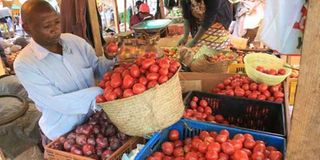Tomato prices in central Kenya fall by 60pc amid oversupply

John Kabatha sorts rotting tomatoes from his stock at Whispers Park market in Nyeri Town on October 17, 2016. Farmers from Kirinyaga, Nyeri and parts of Laikipia counties are getting low returns due to the oversupply. PHOTO | JOSEPH KANYI | NATION MEDIA GROUP
What you need to know:
- Traders are offering farmers as little as Sh20 for a kilogramme of tomatoes.
- This is a decline from last month’s peak of Sh90 to Sh100 per kilo.
- According to Margaret Gathigia, business has been low for the last three weeks.
- Some are dumping some of the tomatoes because they are either rotting or too ripe to be bought.
The price of tomatoes in the central Kenya region has fallen by more than 60 per cent in one month due to oversupply of the commodity.
Traders are offering farmers as little as Sh20 for a kilogramme of tomatoes.
This is a decline from last month’s peak of Sh90 to Sh100 per kilo.
According to Margaret Gathigia, a trader at Whispers market in Nyeri, business has been low for the last three weeks.
“There are too many tomatoes and people are selling them door to door especially those that sell in pick-ups. That way they deliver to every customer who [would have] come to us,” she said.
The traders have blamed the weather and a supply quotient that does not meet the demand for the low prices.
Some are dumping some of the tomatoes because they are either rotting or are too ripe to be bought, leaving stray goats to feast on them.
“We are incurring losses every day [and] we are not managing to pay our suppliers,” said Mr James Mutahi, a trader.
He added that the flow of customers has significantly gone down.
Traders have also blamed the problem on lack of cold storage facilities or a food processing factory.
They say such a factory could use the produce to prepare jams and sauce.
“The County government should help us develop cold storage facilities for our perishable goods and help us access market outside Nyeri,” said Mr Mutahi.
“We want support for our horticultural produce so that we can be bailed out in times of crisis,” said Mr Mutahi.





